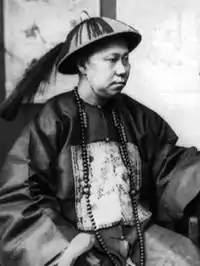Shen Baozhen
Shen Baozhen (1820–1879), formerly romanized Shen Pao-chen, was an official during the Qing dynasty.
Shen Baozhen | |
|---|---|
 | |
| Viceroy of Liangjiang | |
| In office 1875–1879 | |
| Preceded by | Liu Kunyi |
| Succeeded by | Liu Kunyi |
| Personal details | |
| Born | 1820 Minhou, Fuzhou, Fujian |
| Died | 1879 |
| Occupation | Politician |
| Shen Baozhen | |||||||||||||
|---|---|---|---|---|---|---|---|---|---|---|---|---|---|
| Traditional Chinese | 沈葆楨 | ||||||||||||
| Simplified Chinese | 沈葆桢 | ||||||||||||
| |||||||||||||
Biography
Born in Minhou in Fujian province, he obtained the highest degree in the imperial examinations in 1847 and was soon appointed to the Hanlin Academy.
His great administrative abilities attracted the attention of Zeng Guofan, who enlisted him in the effort to suppress the Taiping Rebellion.
Following the suppression of the rebellion in 1864, Shen became actively involved in the Self-strengthening movement and later worked on the Foochow Arsenal in Foochow (Fuzhou). There he established the Qiushi Tang Yiju (求是堂藝局), which became the Foochow Arsenal School, and utilized the skill of French technicians and workers – notably Prosper Giquel – to construct modern warships for the Imperial Navy prior to the destruction of the arsenal and the fleet itself during the Battle of Foochow in the 1883–1885 Sino-French War. Concurrently, he also improved the land tax collection system in Jiangxi province.[1]
He also took part in obtaining a peace settlement with Japan, following the Mudan Incident and Japan's invasion of Taiwan in response to imperial disavowals of sovereignty over the islands' native tribes. He was appointed as the Viceroy of Liangjiang in 1875. He personally visited Taiwan and reformed its administration. The island had consisted of a single prefecture at Taiwan (Tainan); the three subprefectures of Tamsui, Penghu and Kemalan; and the four counties of Taiwan, Fengshan, Chiayi, and Changhua. Shen elevated 2 prefectures, 4 subprefectures, and 4 counties, making the territories smaller and easier to administer. He also launched a military campaign against the aborigines and initiated a building program in southern Taiwan intended to establish a stronger Qing presence and prevent Japanese or European colonization of the area.[2] He died in office in 1879. He was posthumously awarded the title of Senior Guardian of the Heir Apparent.
He is chiefly remembered in European histories for his belated opposition to the Woosung Road Company's railroad, which he purchased and dismantled in its first year of operation,[3] limiting Shanghai's development for twenty years. Shanghai remained unconnected to China's growing rail network until the line's reconstruction in 1898 and its subsequent extension to Nanjing in 1908.
Shen was married to Lin Puqing (林普晴; 1821–77), the third daughter of Lin Zexu. She exhibited great courage and determined tenacity when under siege by the Taiping rebels at Guangxin when she bandaged troops, cooked for them and cut her finger to write a message in blood.
References
| Wikimedia Commons has media related to Shen Baozhen. |
Citations
- Wright, Mary C. The Last Stand of Chinese Conservatism: The T’ung-Chih Restoration, 1862-1874. (Stanford: Stanford University Press, 1962), 154.
- Alsford, Niki (2017). ransitions to Modernity in Taiwan. Routledge. p. 68. ISBN 9781315279190.
- Huenemann, Ralph Wm. Harvard East Asian Monographs, Vol. 109. The Dragon and the Iron Horse: the Economics of Railroads in China, 1876–1937, pp. 2 ff. Harvard U. Asia Center, 1984. ISBN 0-674-21535-4. Accessed 14 Oct 2011.
Bibliography
- Hummel, Arthur William, ed. Eminent Chinese of the Ch'ing Period (1644–1912). 2 vols. Washington: United States Government Printing Office, 1943.
- Pong, David. Shen Pao-Chen and China's Modernization in the Nineteenth Century. Cambridge and New York: Cambridge University Press, 1994.
- Shen, Richard. 'The Yellow Riding Jacket' Xlibris, 2008
| Government offices | ||
|---|---|---|
| Preceded by Liu Kunyi |
Viceroy of Liangjiang 1875–1879 |
Succeeded by Liu Kunyi |